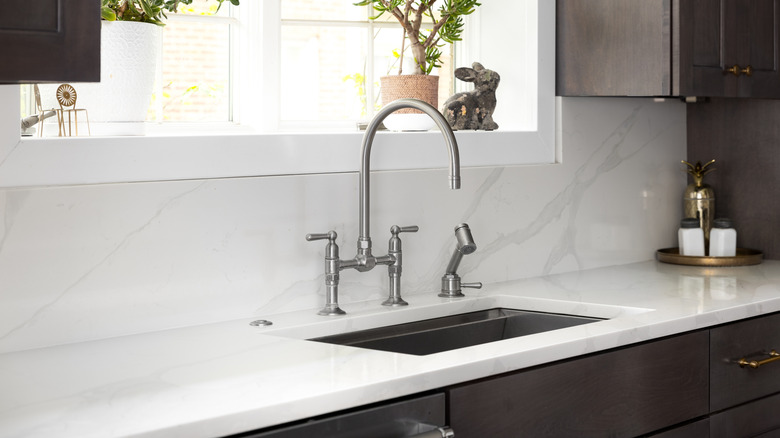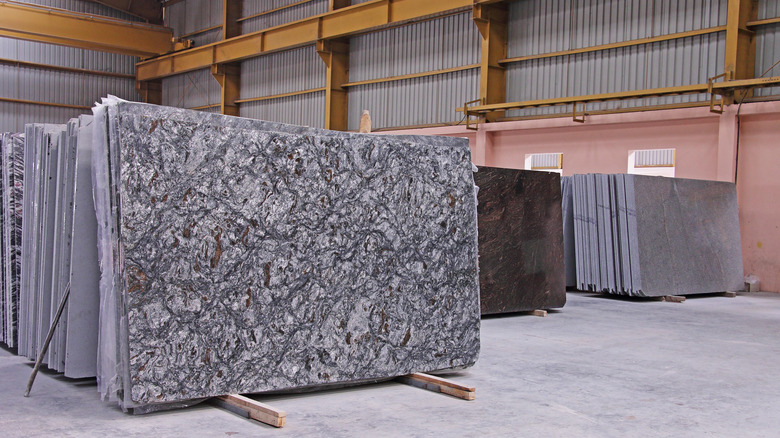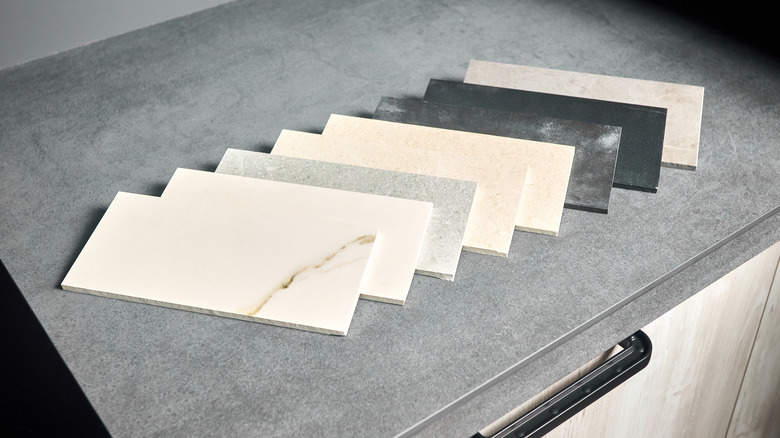The Best Ways To Find Budget-Friendly Countertops For Your Home
Kitchens rank as the most expensive rooms to renovate, with an average cost of $26,972, according to current data from Angi. The countertops alone average $3,155 or more, depending on the material and size. When you start seeing the numbers, it makes sense to find ways to save money when renovating your kitchen. Countertops don't have to eat up a large portion of your budget. Adjusting where you look for your countertops and what types of materials you're willing to consider can give you beautiful results with lower costs.
Traditional sources, such as kitchen showrooms and countertop fabricators, usually cost the most. Getting creative and shopping at alternative spots could cut your expenses significantly. If you're looking for new countertops, cut out the middleman and go directly to the source, or as close as you can get, for materials. Being open to secondhand options is another way to refresh your kitchen without a hefty price tag.
The type of countertop you choose also plays a role in the cost. If you want granite, choose remnants, which are leftover materials from other jobs. The granite is still perfectly fine and comes in large enough pieces to make countertops, but it costs less because it's scrap material from another project. Another option is choosing granite tiles instead of a slab to save money on the installation. Choosing prefabricated countertops also saves money over custom countertops. However, the color and size options are limited, so you may need to be more flexible on what you choose.
Places to find budget-friendly countertops
Just like you can find cheap kitchen cabinets by shopping around, you can also save money on countertops by getting creative with your shopping locations. You can try traditional outlets, including big-box home improvement stores, to look for sales and special discounts. You might find clearance counters that are discontinued as new options are brought in, or special sales at different times of the year, such as Black Friday specials. If you're buying multiple kitchen fixtures or materials at once, ask about package deals.
Buying as directly to the source as possible also saves you money. Look for wholesalers that sell directly to homeowners for cheaper remnants — some have in-house fabricators and may offer delivery services. Countertop warehouses may offer last-chance options at discounted rates. Local countertop suppliers are often more affordable because the distance to deliver them to your home is shorter. Plus, you're supporting a local business.
Secondhand or reclaimed countertops are also an option. Habitat for Humanity ReStore locations offer various home improvement materials, which could include countertops if you're lucky. ReStore locations sell a mix of new and gently used materials, so you might find a deeply discounted option that's never been in a kitchen before. Another option is buying directly from homeowners through local Facebook groups or other online sources. Keep in mind that your kitchen configuration might not match up with the seller's layout. You're also responsible for moving the countertops, which can be quite heavy depending on the material.
Tips for choosing affordable countertops
To stick within your budget, focus your search on the most affordable countertop materials people actually buy, such as laminate and ceramic tile. There is a wide range of prices within each material type — granite can range from $10 to $140 per square foot while laminate varies from $8 to $27 per square foot. Having an idea of what you want but being flexible can keep the costs lower. For example, if you're set on granite countertops, considering different colors and patterns can help you find a beautiful, affordable slab.
Simple countertops are generally less expensive than intricate options. The edge finish can add significantly to the cost if you choose a specialty or intricate profile. Standard edge options include straight, eased, round, and beveled profiles. These options may be included in the cost of fabricating the countertop. If you have to pay for them, the charge is minimal compared to higher-end edges, such as full bullnose, ogee, and cove edges.
You may be able to handle some or all of the work yourself. Getting rid of your existing countertops yourself eliminates the removal and disposal fees that most installers charge. DIY installation is an option for certain materials, such as laminate and ceramic tile. However, natural stone countertops are heavy and dangerous to maneuver, and materials such as granite require specialty tools and expertise in creating the seams, so letting professionals handle those materials is safest.


